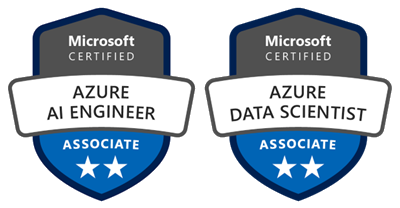Choosing a Certification Path
Certifications ·
In my previous post, I shared my certification journey for Microsoft over the past 2+ years: https://captainhyperscaler.github.io/?p=1261.
In this article, I would like to provide my thoughts and guidance on going down your own path to certification. Everyone’s path is different and these are just my thoughts as someone that has gone through many of the certifications within Azure, Microsoft 365, and Security. I have also taught many of these courses and can provide some thoughts on preparation as well. I will categorize this article in Azure Infrastructure, Azure Data, Azure AI, Azure Developer, Microsoft 365, Security, Power Platform, and Specialty. Microsoft documents their current cloud certifications here: https://query.prod.cms.rt.microsoft.com/cms/api/am/binary/RE2PjDI
Fundamentals Exams. When asking the question “Where do I start with my certifications?”, I always say to start with the fundamentals exams. Microsoft now has 9 fundamentals exams across all of their cloud technologies. Azure (AZ-900) and Microsoft 365 (MS-900) Fundamentals exams cover the broad range of technologies across these platforms. If you are new to IT or the cloud, preparing for these exams might give you some thoughts about what you may be passionate about and what you may want to focus. If you already have some experience in IT, you may determine that starting with a specialty fundamentals exam like data, AI, security, or Power Platform. Whichever direction you take, my opinion is that the Fundamentals exams always provide a good start before you move to the advanced certifications.

Azure Infrastructure. If you determine that Infrastructure is the path that you are excited about, there are great options that can also give you a strong foundation for other paths. The AZ-104, Azure Administrator Associate, exam is your best start. Once you have prepared and cleared this exam, I always tell students to immediately prepare for the AZ-303 exam. They are very similar in objectives and content, and I have guided many students down this successful route. After the AZ-303, the next step is the AZ-304 to complete the Azure Solutions Architect Expert certification. After completing these exams, many then move to the AZ-500 for Azure security or one of the other specialty paths and even specialty certifications. We will discuss each of these paths next.

Azure Data. Microsoft has expanded their role-based certifications for Data over the past year. At first, they only had the Data Engineer Associate path with DP-200 and DP-201 (now combined into the single DP-203 exam). In 2020, they also added the DP-300 exam that focused on SQL and database administration, and the DA-100 Data Analyst certification that covered data analysis and visualization with Power BI. If you are interested in data architecture and engineering, this is a path for you. I recommend still starting with the fundamentals, which is DP-900 for Data Fundamentals. It is also helpful to understand the overall Azure Fundamentals with AZ-900.

Azure AI. AI and Data are tied closely together. You will notice that for the AI exams, it is important to understand how data is ingested from storage accounts, databases, and IoT sources. For this, it may be helpful to combine the AI Fundamentals (AI-900) and Data Fundamentals (DP-900) together as you start down the path of becoming an AI Engineer Associate with the (AI-102) exam, which has recently replaced the AI-100 exam. (Same AI Engineer Associate certification for either exam). Once you have earned the AI Engineer Associate, the Data Scientist Engineer (DP-100) is a good one to move toward. Even though this is technically considered a Data exam by Microsoft, I tend to put the DP-100 in the AI category because of it’s focus on modeling.

Azure Developer. Up to this point, the exams that we have been talking about are very infrastructure and architecture focused. If you are an application developer, you may take a different path. Like with architecture, there is an expert path for the developer. This requires the passing of two exams, but the recommendation is that you take all three in the path. These include passing either the AZ-203 for Azure Developer Associate or the AZ-104 for Azure Administrator Associate, and then passing the AZ-400. The developers that I have spoken to about this path tell me that having both the AZ-203 and the AZ-104 are helpful with the AZ-400 exam. Again, my recommendation is to start with the AZ-900 for Azure Fundamentals and then move into the path to obtain the Azure DevOps Expert certification. Taking this path will earn you the Fundamentals, an Associate, and an Expert certification.

Specialty exams. There have been a number of specialty exams that have been added by Microsoft. These are both infrastructure and developer focused. The infrastructure focused exams are AZ-120 for SAP on Azure and AZ-140 for Windows Virtual Desktop. Their is a developer specialty with AZ-220 for IoT Developer. There is another infrastructure exam that I am putting in the Specialty category, even thought it is an Associate certification. This is the AZ-600 for Azure Stack Operator Associate. These are all considered in this category, because they should come after obtaining at least an Associate level certification in infrastructure or developer areas.
Microsoft 365. If your focus is on Modern Workplace and Microsoft 365, there is a specific path for you as well. There are numerous Associate and Expert paths depending upon your focus areas. If your focus is on devices, the MD-100 and MD-101 can get you the Modern Desktop Associate certification. There are Associate certification for M365 Security Administrator (MS-500), Microsoft Teams Administrator (MS-700), and Messaging Administrator (MS-203). There is also a Developer Associate certification with MS-600. Each one of these Associate exams combined with the MS-100 and MS-101 exams will earn you the Microsoft 365 Administrator Expert certification. Like I have emphasized throughout, heading down this path should begin with the MS-900, Microsoft 365 Fundamentals exam.
Security, Compliance, and Identity. Recently, Microsoft created a new path focused on Security, Compliance, and Identity (SCI). This path has taken the existing Azure and Microsoft 365 security exams, AZ-500 and MS-500, respectively, and added four additional exams to provide both a Fundamentals and specialized path for SCI. Taking this path, my recommendation is to start with the SC-900 Fundamentals certification and then pick your path to Azure or Microsoft 365. Then pick your path to specialize for the next steps. This can be Identity and Access (SC-300), Information Protection (SC-400), or Security Operations (SC-200). Each of these exams earn you an Associate certification. If you are administration of either Azure or Microsoft 365, I recommend the SC-300. If you want the full background of security in the Microsoft cloud, you can go for all of these certifications. My recommended order is how I listed them above.

Power Platform and Dynamics 365. I will round out this talk about certification paths within Microsoft with Power Platform and Dynamics 365. This is not my area of focus or expertise, but again, if you are interested in these solutions, there are four Fundamentals exams in this path, one for Power Platform (PL-900), and three for Dynamics 365 (MB-901, MB-910, and MB-920). These are based on the Dynamics 365 solution that you are focused as Microsoft has split Dynamics into specialized areas of CRM or ERP use. This is the same for the Associate and Expert exams for Dynamics. See the certification poster for more detail in this area: https://query.prod.cms.rt.microsoft.com/cms/api/am/binary/RE2PjDI
Power Platform has been tied closely within the Dynamics 365 path as Dynamics data and utilizing it for customer service and visualizations with in Power Apps is extremely useful. Within the Power Platform certifications, there is also the DA-100 certification that was mentioned earlier in the Data path, since Power BI is an integral solution to use with Power Platform solutions for visualization of data. There are three Associate certification, PL-100, PL-200, and PL-400, and one Expert certification, PL-600, for Power Platform. The Expert certification requires passing either the PL-200 or the PL-400, along with the PL-600 exam.
Summary.
My hope within this article is to provide you with some clarity and guidance when determining a certification path. I took my path as I explained in my previous post: https://captainhyperscaler.github.io/?p=1261, but you should find your own path and areas of interest as you journey through your Microsoft certifications. I welcome your thoughts and feedback, and feel free to reach out on social media with any additional questions. Thank you very much.
